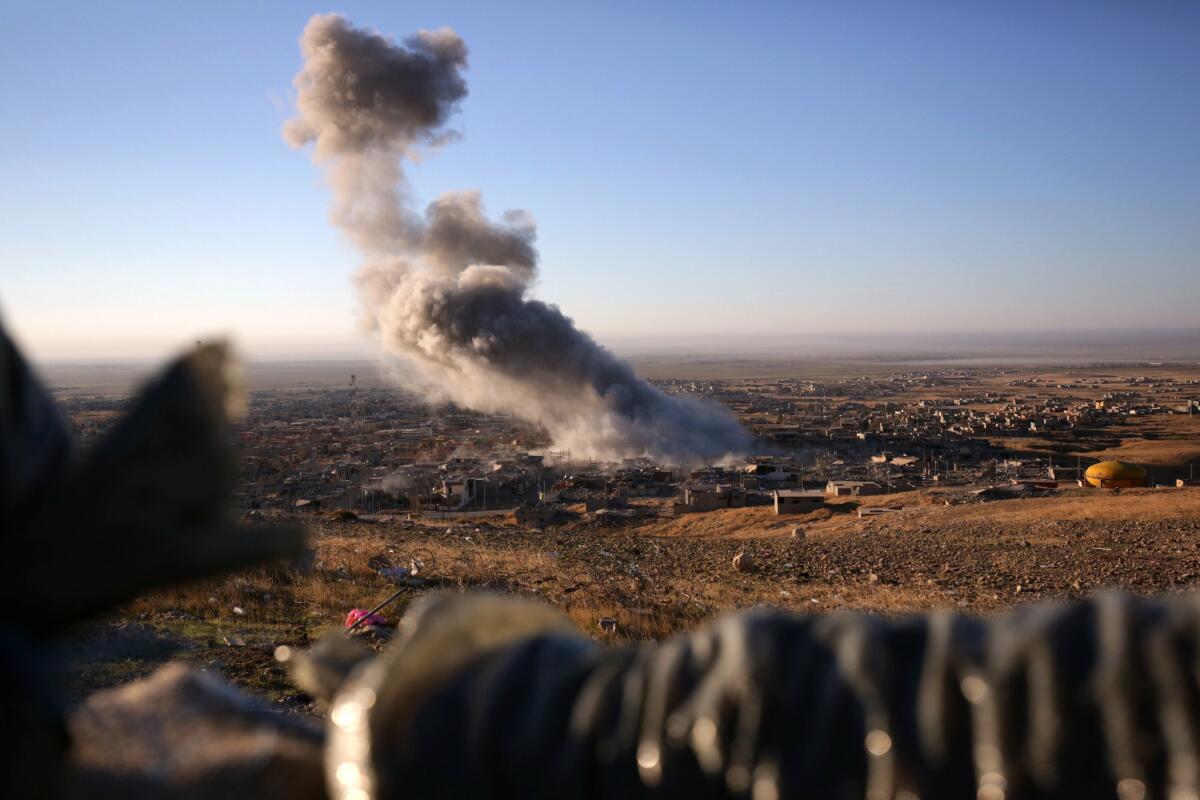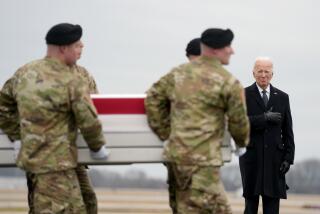Iraqi Kurds, with U.S. help, wage offensive to retake Sinjar from Islamic State

Smoke believed to be from an airstrike rises from the northern Iraqi town of Sinjar on Nov. 12.
Reporting from Beirut — More than a year after President Obama ordered airstrikes to protect civilians trapped on Mt. Sinjar in Iraq, Kurdish forces backed by the U.S. on Thursday launched a broad offensive to retake the city of Sinjar from Islamic State militants.
The coordinated attack in Iraq’s northwest appears to be part of a more assertive approach by the Obama administration against Islamic State. The White House has been harshly criticized for not doing enough to stem the growth of the Al Qaeda spinoff group, which controls vast areas of Iraq and neighboring Syria.
Some critics have charged that a U.S. approach perceived as slow-moving is in stark contrast to the Russian air campaign in Syria, which in less than six weeks has provided support to Syrian government ground offensives against Islamic State and other Syrian rebel groups.
NEWSLETTER: Get the day’s top headlines from Times Editor Davan Maharaj >>
“We saw an opportunity, the Iraqi Kurdish forces saw an opportunity, and we’re taking advantage of that as we move forward,” Pentagon spokesman Peter Cook told reporters in Washington on Thursday.
The offensive comes two weeks after the White House announced that it was dispatching special operations commandos to Kurdish-controlled areas of northeastern Syria to work with militias fighting against Islamic State.
While the number of commandos will be small, fewer than 50, the White House said, their mission still marked the first time that American forces were deployed openly in Syria.
In Iraq and Syria, the Obama administration has viewed Kurdish fighters as key allies, though deep ideological differences divide the principal Kurdish forces in the two countries.
In support of the Iraqi Kurds’ offensive to retake Sinjar, the Pentagon said, the U.S.-led coalition conducted 36 airstrikes within 24 hours in the area.
A key goal in recapturing Sinjar, commanders said, is the severance of a critical supply line between the Islamic State strongholds of Raqqah in Syria and Mosul in Iraq. Sinjar sits along that key militant supply corridor, which U.S. officials refer to as Highway 47.
U.S. military personnel are working with Kurdish commanders behind the front lines in Iraq to help direct the offensive, the Pentagon said. U.S. spotters are also seeking targets and directing airstrikes in support of the Kurdish ground offensive, U.S. officials said.
About 7,500 Kurdish troops backed by artillery were advancing Thursday on three fronts toward Sinjar, officials said. Commanders reported capturing several villages on the approach to Sinjar and cutting off portions of Highway 47.
Video aired on Iraqi television showed columns of smoke rising from the Sinjar area after bombardment by the U.S.-led coalition.
The offensive to retake Sinjar is fraught with strategic and symbolic significance. The area gained global notoriety last year after it was overrun by the Islamist extremists as part of their stunning blitz across northern Iraq.
Sinjar, about 30 miles east of the Syrian border, was home to the largest concentration of adherents of the minority Yazidi sect. Yazidis fled en masse to escape massacres and enslavement at the hands of the Islamist extremists.
Tens of thousands of Yazidis took shelter last year along the flanks of Mt. Sinjar, their fate drawing worldwide concern.
The possibility that Iraq’s Yazidis faced genocide was cited by Obama in August 2014 when he authorized airstrikes against the militants in Iraq and airdrops of humanitarian supplies for civilians trapped on the mountain.
That was the start of an air campaign that has since spread to Syria and involved more than 8,000 airstrikes. Obama vowed at the time to “degrade and ultimately destroy” Islamic State.
More than a year after the air campaign was launched, however, Islamic State still dominates broad areas of Iraq and Syria. Mosul, one of Iraq’s largest cities, remains under Islamic State dominion.
Taking Sinjar would be a major victory against Islamic State. Elsewhere in Iraq, U.S. officials say Iraqi government forces are preparing an offensive to retake the western city of Ramadi from the extremist group.
The militant advance in 2014 triggered the flight of hundreds of thousands of Iraqis, mainly minorities, including Christians, Shiite Muslims and Yazidis, followers of an ancient faith linked to pre-Islamic Mesopotamian creeds.
Islamic State, an ultra-fundamentalist Sunni supremacist movement, regards Yazidis as infidels and was accused of massacring hundreds and enslaving Yazidi women.
Last year’s militant offensive occurred before the group changed its name to Islamic State, from Islamic State of Iraq and Syria. In its ranks are foreign fighters and homegrown Syrian and Iraqi extremists, including ex-loyalists of former Iraqi strongman Saddam Hussein, deposed in the U.S.-led 2003 invasion.
The Obama administration has been under considerable political pressure to show improved results against Islamic State forces, especially since Russia launched its air campaign in Syria on Sept. 30. Some Iraqi lawmakers publicly sought Russia’s assistance, but Washington balked at Moscow’s involvement in Iraq.
In the last month, the Pentagon said in a statement, the U.S.-led coalition has conducted more than 250 airstrikes across northern Iraq, hitting an array of Islamic State targets, including weapons depots, staging areas and bomb factories. The bombardment was meant in part to weaken militant positions around Sinjar.
The new offensive is meant to degrade the militants’ resupply chain, disrupt funding sources, stem the flow of militant fighters into Iraq from Syria and “further isolate Mosul” from Raqqah, Col. Christopher C. Garver, a spokesman for the U.S.-led coalition attacking Islamic State, said in a statement. Raqqah is the de facto capital of the group’s self-declared “caliphate.”
The assault also offers a second chance for Kurdish fighters, whose ignominious retreat last year in the face of the Islamic State onslaught was a humiliation for the forces, known as peshmerga. Many Yazidis and others assailed Iraqi Kurdish troops for hastily withdrawing from the area and leaving civilians unprotected.
The peshmerga gained a fierce reputation as rebels fighting Hussein’s forces but proved less effective against the Islamic State militants.
Islamic State forces advanced to within about 25 miles of Irbil, the Kurdish Iraqi capital, last year before being pushed back with the help of U.S. airstrikes. The strength of the militants and the amount of support for them among Sunni Arab populations in Iraq caught Kurdish and Iraqi officials off guard.
In the last year, U.S. and European military advisors have been dispatched to northern Iraq to help shore up and train forces in the semiautonomous Kurdish region.
The fight to regain Sinjar, which once had a population of more than 100,000, could be protracted. Islamic State defenders have had time to fortify positions in the city and plant roadside bombs and booby traps in outlying villages and suburbs.
U.S. military officials estimated that it would take Kurdish forces two to four days to secure the city and one more week to clear it of militants. About 600 Islamic State fighters are believed to be in the city, officials said.
“ISIL has well-prepared defenses,” the official said, using a common acronym for Islamic State. “We expect this will be a tough fight and we expect ISIL will defend [Sinjar] fiercely.”
For Iraq’s Yazidi minority, Thursday’s offensive offered a chance at regaining homes and land lost last year to the Islamist extremists. Hundreds of Yazidis remain missing from last year’s militant push across northern Iraq. Tens of thousands of displaced Yazidis now live in rugged camps and half-finished buildings in Iraq and Kurdish-controlled areas of Syria.
“I feel great happiness and I congratulate all the Yazidis,” Iraqi lawmaker Vian Dakhil, a Yazidi, said in an interview on the Kurdish news site Rudaw. “We have given many sacrifices and martyrs.... I wish I were now on the expanse of Sinjar Mountain with my peshmerga brothers and sisters.”
Times staff writers McDonnell reported from Beirut and Hennigan from Washington. Special correspondents Nabih Bulos in Dubai, United Arab Emirates, and Kamiran Sadoun in Irbil, Iraq, contributed to this report.
Follow McDonnell on Twitter at @mcdneville for news out of the Middle East
ALSO:
Twin suicide bombings kill 16 in Lebanon’s capital
In Athens, former Olympic venues now play host to refugees
Israeli forces again raid a West Bank hospital in search of a wounded suspect
More to Read
Sign up for Essential California
The most important California stories and recommendations in your inbox every morning.
You may occasionally receive promotional content from the Los Angeles Times.










